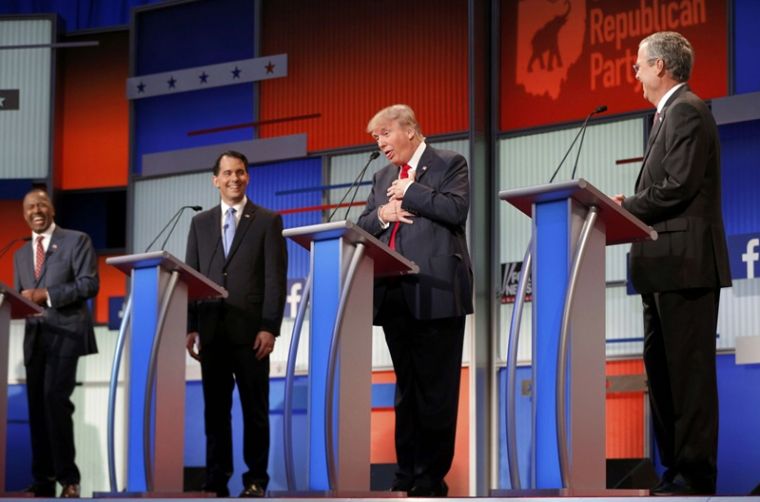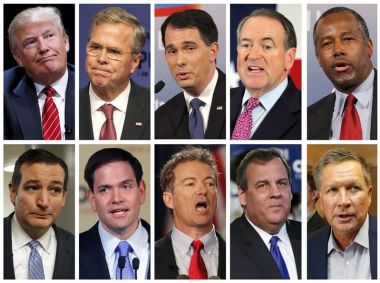Republican candidates and faith: What have we learned from the campaign?

Donald Trump remains the most high-profile Republican candidate for the 2016 Presidential race. Many commentators expected him to have burned out by now but he is still in the race and polling well. But with this longevity has come increased scrutiny. Twice in the last couple of weeks he's been challenged on his faith.
While eyebrows have been raised at Trump's recent professions of deep faith, every candidate has touched on on spiritual matters during the camapign - some with more ease and experience than others. The way they answer questions about God can be vital to their success or failure as candidates.
In previous years antipathy towards Roman Catholics might have been an area of agreement among candidates. Now, several of the candidates themselves are Catholics, while there are a number of others of various Protestant denominations. But that hasn't prevented Republican-friendly media outlets from railing against Pope Francis during his visit. Instead of focusing on this, the candidates have been questioned on other faith related areas, such as Islam and the Bible. So are the leading contenders for the nomination likely to pass the 'faith test' on the potential road to the White House?
Donald Trump
Trump has frequently referred to the Bible as his favourite book. This may have seemed like a savvy move for his campaign, helping to attract the Christian base of the Republican Party alongside the more pro-business faction that is his natural home. There is only one problem. When he was asked to mention his favourite verse, he declined to do so, claiming it was a private matter. He was then given another softball question about the Bible and this time seemed to make up a verse in Proverbs that doesn't appear to exist. In the same interview, he managed to turn a question about who God is into an answer about how great he is at business deals.
Trump's latest pronouncement on faith saw him declare himself to be an evangelical Christian, saying, "I love them... I mean, I'm one of them, in a true sense. I'm Protestant. I'm Presbyterian."
Ben Carson
For some of the campaign so far Dr Carson has struggled to cut through in the large field of Republican candidates – despite not being a professional politician, and being the only African American candidate. But that has begun to change recently and he made headlines this week with his comments on Islam. Carson said, "I would not advocate that we put a Muslim in charge of this nation. I absolutely would not agree with that."
He has begun to row back from these comments slightly, saying, "If there's somebody who's of any faith, but they say things, and their life has been consistent with things that will elevate this nation and make it possible for everybody to succeed, and bring peace and harmony, then I'm with them." This has been the most significant faith intervention he has made in the campaign. Carson, a Seventh Day Adventist, when asked about God during one of the Republican debates instead chose to focus on race relations in America.
Jeb Bush
The latest member of the Bush dynasty to run for the top office has been vocal about his Catholic faith during the campaign. For example he recently wrote an op-ed for CNN describing how his beliefs have influenced him, "I have witnessed the power of God, through his church, to touch lives and transform the world – both on the world stage and in my own heart. The church has grounded me and my beliefs in a deep way of thinking about mercy, penance and the dignity and potential of every life, young and old, rich and poor, born and not yet born."
However, Bush's opinions on several policy matters seem to be at odds with Pope Francis. For example, on climate change, Bush said, "I hope I'm not going to get castigated for saying this by my priest back home. But I don't get my economic policy from my bishops or my cardinals or my pope... [religion] ought to be about making us better as people and less about things that end up getting into the political realm."
Not only is this an odd way to read Catholic social teaching, it was in stark contradiction to what he'd previously claimed... "As a public leader, one's faith should guide you. In the United States, many people think you need to keep your faith, put it in a security box, if you're an elected official – put it in a safety deposit box until you finish your service as a public servant and then you can go get it back. I never felt that was appropriate."
Marco Rubio
The Florida Senator has had roller coaster faith journey including being baptised as a Mormon and a Roman Catholic. He is now a committed Catholic who also attends a Southern Baptist church.
He did suggest Christians are at risk of discrimination in contemporary America earlier in the campaign, and added, "After they are done going after individuals, the next step is to argue that the teachings of mainstream Christianity, the catechism of the Catholic Church is hate speech and there's a real and present danger." He has since gone a little quieter on faith issues.
Ted Cruz
Cruz, the son of a preacher and Southern Baptist has been popular with Conservative Christian voters since announcing his candidacy. Like Rubio, he has claimed religious liberty is under attack.
Despite that popularity with conservatives, Cruz found himself up against accusations that he was out of step with Ronald Reagan on a number of policies. Appearing on the Late Show with Stephen Colbert, he was challenged over the ways his policies diverge from those of Reagan.
Mike Huckabee
Huckabee has been determined to speak about God as much as possible on the campaign trail. He described God as "more real to me as the clouds" in a recent interview.
The Southern Baptist pastor and former Governor of Arkansas has been vocal not only about his faith, but especially his opinion of the faith of others. Speaking about President Obama, Huckabee declared, "I'm less concerned about what faith the person has. I'm more concerned about the authenticity of their faith and how that plays out in their politics... I'm also concerned about a guy that believes he's a Christian and pretends to be and then says he is, but then does things that makes it very difficult for people to practise their Christian faith."
Having said that Obama pretends to be a Christian, he has also defended Kim Davis in her attempt to defy the Supreme Court's decision on same sex marriage.
Carly Fiorina
The only woman in the race has a large amount of business experience but had been more reticent to talk about faith issues. She has said she is "an irregular churchgoer, not devoted to any denomination." This has prompted articles which examine her faith in more depth. However, since the campaign stepped up a notch, she has used stronger words to describe faith on the campaign trail, when speaking to Christian audiences, such as describing her "personal relationship with Jesus Christ."
Fiorina also decided to directly challenge Carson's statement about Muslims, saying, "I think that's wrong. It says in our Constitution that religion cannot be a test for office."
Rand Paul

The most libertarian of the candidates, Paul has not played up his Presbyterian faith – but with his wife being a deacon of their church, his commitment is obvious. However, he has admitted to doubts and also been criticised by some evangelical leaders in the past.
In answer to Huckabee's suggestion that President Obama was pretending to be a Christian, Paul has responded that, in fact, he is a believer. However, Paul has also harshly criticised Obama, especially over Planned Parenthood and 'Obamacare.' "If you want to shut down the government over spending money on harvesting organs from babies, so be it," he said, "but we will take a stand."
Bobby Jindal
The Louisiana Governor has struggled to cut through and make headlines in the race so far. He is a staunch Roman Catholic and has made clear the religious inspiration for his campaign since it began. He claimed the biggest form of discrimination in American society is faced by Christians who oppose same sex marriage.
Jindal describes himself as an 'evangelical Catholic' which may seem like he's trying to win friends in various parts of the Republican base. But, having converted from Hinduism, he has a powerful way of communicating with religious conservatives. However, popularity with certain sections of the Christian electorate won't in itself be enough for him to secure the nomination on its own.
Rick Santorum
Santorum's unlikely popularity in the 2012 campaign had some thinking this would be the moment for him. But again, the Catholic former Senator from Pennsylvania has struggled to break through in a crowded field.
Interestingly, Santorum did better among Protestants than Catholics in the previous campaign. The Papal visit to the US may have seemed like an ideal opportunity for Santorum to boost his profile, but instead he has found himself at odds with Pope Francis over climate change. Santorum said, "I think when we get involved with controversial political and scientific theories, then I think the Church is probably not as forceful and credible."
Chris Christie
There was a time when Chris Christie looked like the frontrunner for the Republican nomination. While he probably was never the favourite among conservative Christians it was thought his popularity outside the Republican base would make him a good choice. His judgement has since been called into question and he has seen his poll numbers fall.
Christie is a Catholic, but on the campaign trail has spoken about ways in which he finds it difficult to agree with Church teaching, especially on birth control, "My church has a teaching against birth control," said the governor. "Does that make me an awful Catholic, because I believe and practised that function during part of my life? I don't think so."











